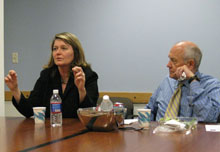Event
Columnist Connie Schultz gives voice to working class

April 1, 2009 — At the Shorenstein Center’s brown-bag lunch, Pulitzer Prize–winning columnist Connie Schultz of the Cleveland Plain Dealer shared her experiences with “The Politics of Covering Regular People.” Reporting on ways that workers are exploited or mistreated, she has found that “most people want to make a difference, but they don’t know how.” By telling the stories of those who do not have a public voice, Schultz is able to mobilize public action and raise awareness of otherwise invisible complaints.
Explaining why she began covering working-class people in the Midwest, Schultz said, “I come by it honestly — these are the people I come from, and they are so often misrepresented.” “The privileged already have their spokesmen,” she said.
Schultz said that it is not enough to notice the injustice in the world, or even to get angry about it. “Anger comes when you feel like you can’t do anything about it,” she said. “You start losing your rage when you can see how you can make a difference.” Without revealing anger in her writing, Schultz is able to expose injustices by taking action. “When you speak up, things happen,” she said.
When asked how she deals with the “fatigue factor” of covering stories about common issues, such as families losing their homes during the economic crisis, Schultz said that she focuses on searching for “any glimmer of hope and letting the world know.”
For example, writing about a job fair in Cleveland that seemed hopeless — thousands of people applying for a hundred jobs — Schultz described a minister who handed out umbrellas to applicants standing in long lines in the rain. Schultz said that it gave her readers hope to see a “moment of kindness through all the misery.”
This article was written by Janell Sims and the photos taken by Leighton Walter Kille, both of the Shorenstein Center.